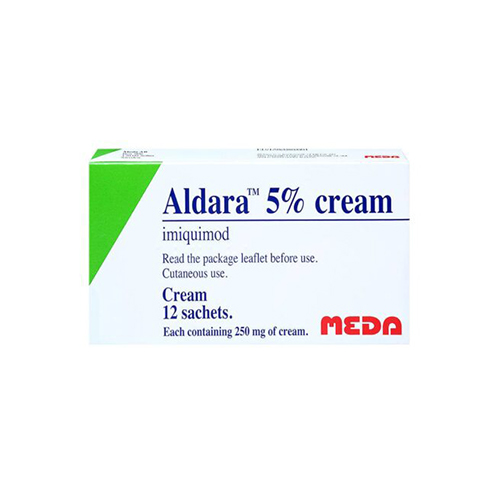- Treatment of genital warts
- Topical application
- Apply three times a week
Aldara
Aldara cream may be used for three different conditions including for the treatment of Warts on the surface of the genitals (sexual organs) and around the anus (back passage).
What is Aldara?
Aldara cream can be used for many conditions and contains the active ingredient Imiquimod.
Your doctor or GP may prescribe it for treatment of:
- Treatment of warts on the surface of the genitals (sexual organs), or around the anal area (back passage).
- Treatment for superficial basal cell carcinoma commonly seen on the surface of the skin. These are slow-growing forms of skin cancer that usually do not spread to other parts of the body, and are usually seen in middle-aged or elderly people with fair or light skin tone.
- Treatment of actinic keratosis, which is a rough area of the skin seen in people who have been exposed to a lot of sunshine over their lifetime. These can be flat, raised or scaly wart-like in appearance, but Aldara is only licensed to use on flat actinic keratosis on the face or the scalp.
How does Aldara work?
Aldara contains the active ingredient Imiquimod, which helps your body’s own immune system to stimulate a natural defence mechanism (cytokine response).
This cytokine response helps to fight the human papillomavirus that causes genital warts and helps to stop the growth of malignant or abnormal cells in patients with basal cell carcinoma and actinic keratosis.
Who should not use Aldara?
It is advised that if you have previously used Aldara cream or other similar preparations tell your doctor before starting this treatment.
- Do not use Aldara for more than one course if you have problems with your immune system, either due to illness or because of the medicines you are already taking.
- Tell your doctor if you have an abnormal blood count.
- If you are HIV positive you should inform your doctor, as Aldara cream has not been shown to be as effective in HIV positive patients. (Aldara cream does not protect against HIV or other sexually transmitted diseases).
How to use Aldara
(For treatment of Genital Warts, you can obtain a repeat prescription for Aldara from Access Doctor if your own doctor or GP has already diagnosed and recommended the product for you).
Aldara cream is not licensed for use in children and adolescents
Treatment of Genital Warts in Adults:
- Apply three days each week; (e.g. Mon, Wed, Fri)
- Apply a thin layer of the cream onto a dry area and rub gently into the skin
- Leave cream on for between 6-10 hours, then wash off with soap and water
- Continue to use Aldara cream until warts have completely gone, this can vary from person to person
For further information on Aldara and all the conditions treated, please follow the patient information leaflet attached for download.
Side effects & precautions
Use of Aldara (Imiquimod) should be restricted in pregnancy and breastfeeding unless absolutely necessary and advised by a doctor or GP.
Any person with pre-existing skin allergies or sensitivity to any ingredients found in Aldara are asked to speak to a doctor before starting the treatment.
Avoiding all sexual intercourse whilst the cream is applied to the skin, and using condoms if necessary.
What are the side effects of Aldara?
Many of the undesirable effects of the cream are due to its local action on your skin.
Some common Side effects include:
- Redness and irritation of the skin
- Wearing away of the skin
- fever and flu-like symptoms
- joint and muscle pains
- Diarrhoea and vomiting
- feeling sick
- stomach and bowel symptoms
- tiredness
If any side effects get serious, or if you notice any side effects not listed in this leaflet, please tell your doctor or pharmacist.
Reporting of side effects
If you get any side effects talk to your doctor or pharmacist. This includes any possible side effects not listed in this leaflet. You can also report side effects directly via the internet at www.mhra.gov.uk/yellowcard. By reporting side effects, you can help provide more information on the safety of this medicine.




We’re here to help.
Our friendly team is available to help Monday to Friday 9:00am - 5:00pm.
If you need urgent assistance, do not use this service. Call 111, or in an emergency call 999.

